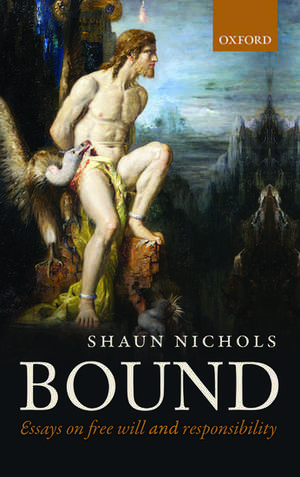Bound: Essays on free will and responsibility
Autor Shaun Nicholsen Limba Engleză Hardback – 8 ian 2015
| Toate formatele și edițiile | Preț | Express |
|---|---|---|
| Paperback (1) | 167.49 lei 31-37 zile | |
| OUP OXFORD – iun 2017 | 167.49 lei 31-37 zile | |
| Hardback (1) | 447.42 lei 31-37 zile | |
| OUP OXFORD – 8 ian 2015 | 447.42 lei 31-37 zile |
Preț: 447.42 lei
Preț vechi: 492.59 lei
-9% Nou
Puncte Express: 671
Preț estimativ în valută:
85.63€ • 89.06$ • 70.69£
85.63€ • 89.06$ • 70.69£
Carte tipărită la comandă
Livrare economică 02-08 aprilie
Preluare comenzi: 021 569.72.76
Specificații
ISBN-13: 9780199291847
ISBN-10: 0199291845
Pagini: 200
Dimensiuni: 144 x 222 x 18 mm
Greutate: 0.39 kg
Editura: OUP OXFORD
Colecția OUP Oxford
Locul publicării:Oxford, United Kingdom
ISBN-10: 0199291845
Pagini: 200
Dimensiuni: 144 x 222 x 18 mm
Greutate: 0.39 kg
Editura: OUP OXFORD
Colecția OUP Oxford
Locul publicării:Oxford, United Kingdom
Recenzii
Few philosophy books are as diversely valuable to the discipline as this engaging volume on free will ... scholars at the highest levels will be seriously interested in Nichols's techniques, which rely on experimental philosophy to analyze the psychological motivations for the inferences and positions in the classic free will debate. The prose is lucid, the book is well organized, and the science and philosophy are seamlessly integrated ... Essential.
What is manifestly true is that this book is worth the careful attention of anyone interested in moral psychology, moral responsibility, or the methodological issues that constrain philosophical debates. At the heart of Nichols' theory is a picture of moral responsibility as a deeply human practice, one that plays an important moral and practical role in our lives.
...Nichols work is an invaluable asset, bringing together recent work in psychology and experimental philosophy and analyzing them in the context of the free will debate.
It should be added as course material for philosophy classes.
bound advances the discussion in novel and intriguing ways. The result is another valuable contribution from one of the best empirally informed and experimental philosophers around.
What is manifestly true is that this book is worth the careful attention of anyone interested in moral psychology, moral responsibility, or the methodological issues that constrain philosophical debates. At the heart of Nichols' theory is a picture of moral responsibility as a deeply human practice, one that plays an important moral and practical role in our lives.
...Nichols work is an invaluable asset, bringing together recent work in psychology and experimental philosophy and analyzing them in the context of the free will debate.
It should be added as course material for philosophy classes.
bound advances the discussion in novel and intriguing ways. The result is another valuable contribution from one of the best empirally informed and experimental philosophers around.
Notă biografică
Shaun Nichols is Professor of Philosophy at the University of Arizona. He is the author of Sentimental Rules: On the Natural Foundations of Moral Judgment (OUP, 2004) and co-author (with Stephen Stich) of Mindreading (OUP, 2003). He is editor of The Architecture of the Imagination (OUP, 2006) and co-editor of Experimental Philosophy (with Joshua Knobe; OUP, 2008; 2014). He has also published over 100 articles at the intersection of philosophy and psychology.
























